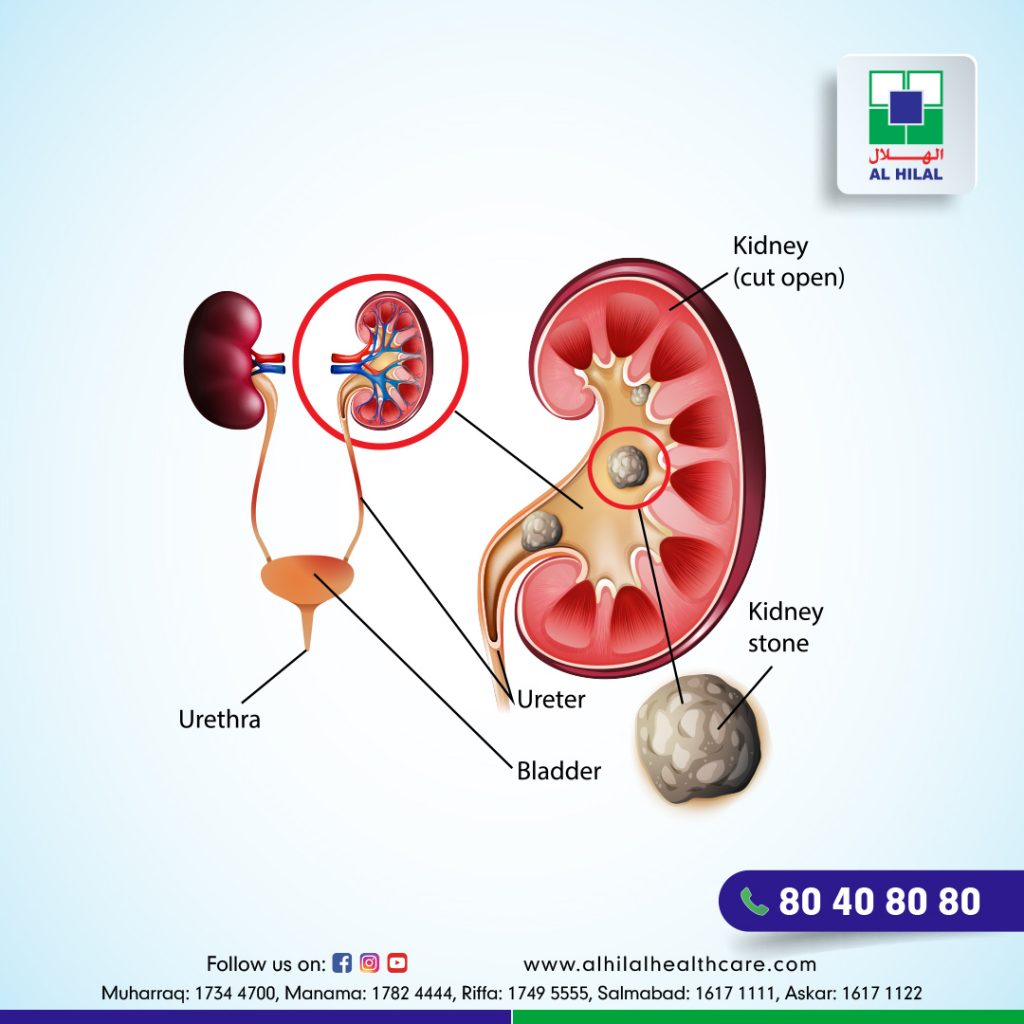Kidney stones are also known as nephrolithiasis, renal calculi, or urolithiasis. They are hard deposits, made up of salts and minerals, inside the kidneys. According to statistics, every one in ten individuals would have kidney stones pain sometime in their lives. There are four types of kidney stones: struvite, uric acid, calcium oxalate, and cystine.

Kidney stones usually start small, but they can continue to grow larger in size, filling in the hollow inner structure of the kidney. Sometimes they stay in kidney and do not cause problems. However, if these stones become lodged in ureter (tube between bladder and kidney), it can block the flow of urine from the kidney and cause kidney stone pain. If they travel down ureter and reach bladder, they can pass out of the body in urine.
To get checked for kidney stones or any other kidney-related issue, consult an expert Urologist. Al Hilal Hospital Bahrain is one of the very few hospitals with male as well as female Urologist in Bahrain. Click here to get an insight on Urological diseases and misconceptions about Urology and kidney stones.
For appointments and information, contact us today. For your convenience, our representatives are also available on WhatsApp helpline, in Al Hilal Manama, Salmabad, Riffa and Muharraq branches. We aim at providing affordable yet exceptional healthcare services to all our patients, with exclusive packages and privilege cards for additional benefits.
Kidney Stones Causes
Many minerals and salts are present in urine- these salts and minerals can also form stones if they are in high levels. Kidney stone causes mainly include
- Not drinking enough water
- Too much or too little exercise
- Weight loss surgery
- Obesity
- Infections
- Family history might also be the reasons in some patients
What Foods Cause Kidney Stones?
Certain food items can also cause kidney stones, including too much sugary and saltish food. Intake of excess fructose correlates also increases risk of forming kidney stones. If you are looking for ‘what food items cause kidney stones’, avoid chocolate, beets, spinach, tea, rhubarb, and some of the nuts that are rich in oxidates.
Kidney Stones Symptoms
Kidney stones symptoms/ signs of kidney stones usually do not occur until the stone moves within kidney or passes in ureter. If the kidney stone lodges in ureters and blocks urine, it causes swelling in kidney and spasm in ureter, hence causing the following signs of kidney stones:
- Sharp and severe pain in back, below and side of ribs
- Pain radiating towards groin and lower abdomen
- Pain fluctuating in intensity and coming in waves
- Burning sensation and pain while urinating
- Severe pain making it difficult to sit still or find a comfortable position
In addition to the above, kidney stone symptoms also include:
- Red, pink, or brown urine
- Foul smelling or cloudy urine
- Urinating more often than usual, in small amounts and persistent need to urinate
- Vomiting and nausea
- Chills and fever might also occur if an infection is present
If the kidney stone moves through urinary track, pain might also shift to another location of increase in intensity
If you are having symptoms of kidney stones, consult an expert Urologist. Al Hilal Hospital Bahrain is one of the very few hospitals with male as well as female Urologist in Bahrain. For appointments and information, contact us today. For your convenience, our representatives are also available on WhatsApp helpline, in Al Hilal Manama, Salmabad, Riffa and Muharraq branches.
How to Prevent Kidney Stones
Increasing water intake assists in keeping the urine less concentrated with waste products, and hence decreases the chances of forming kidney stones. Water is better than tea/ coffee, soda, and sports drinks- if it is hot outside or if you are working-out, better replace all drinks with water, to avoid kidney stones. The answer to question ‘how to prevent kidney stones’ mostly revolves around increasing fluid intake and limiting sugar and high-fructose food items.
Taking more vegetables and fruits makes urines less acidic- which decreases the chances of forming kidney stones. On the other hand, animal protein produces more acidic urine, hence increase chances of kidney stones.
Reduce salt in diet, by avoiding salty french fries and potato chips, canned soups, sandwich meats, sports drinks, and packaged meats.
High-protein weight loss diets usually contain large quantity of animal-based protein and can increase risk of forming kidney stone. Taking balanced diet with adequate protein decreases this risk.
Kidney Stones Treatment
Kidney stones treatment depends on several factors, including the type of stones, how long did you have it and how bad is the pain. Some of the most used treatment methods include
Waiting for the stone to pass: if you have a small stone, there are no signs of infection, the kidney is not completely blocked, and pain is bearable- you can wait for four to six weeks to pass by itself. While waiting, the patient should drink normal quantity of water and take pain medication if required.
Medication: Tamsulosin (Flomax) is the most used medication for improving chances of stone passing out of the body, by relaxing the ureter. The patient might also need anti-nausea and pain medication during the process.
How to dissolve kidney stones? if you are looking for ‘how to dissolve kidney stone’, apple cider vinegar is the answer. The acids in apple cider vinegar tend to react with the compounds that form kidney stones- reducing the size and eventually dissolving the stones.
Surgery: if the stone fails to pass or is taking too long, and kidney functions are being affected- surgery might be required. The most common form of surgeries to remove kidney stones are:
- Shock wave lithotripsy (SWL)
- Ureteroscopy (URS)
- Percutaneous nephrolithotomy (PCNL)
- Open, laparoscopic, or robotic surgery
Al Hilal Hospital Bahrain, Department of Urology
If you are having any symptoms of kidney stones, get in touch with Al Hilal Hospital Bahrain, Department of Urology. We have highly qualified and experienced male and female Urologists, modern equipment, and state-of-the-art laboratories- to provide ideal healthcare services to all our patients.
At Al Hilal Hospital Bahrain, Department of Urology, our professional and trained urologists have proven record of providing accurate diagnosis with surgical as well as non-surgical methods of removing kidney stones. We aim at providing affordable yet exceptional healthcare services to all our patients, with exclusive packages and privilege cards for additional benefits.
Contact Al Hilal Hospital Department of Urology today and get consultation with the experts in their field for early diagnosis and effective treatment. For your convenience, our representatives are also available on WhatsApp helpline, in Al Hilal Manama, Salmabad, Riffa and Muharraq branches.


